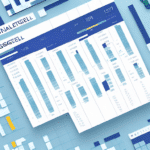Introduction to Blockchain Technology in Logistics
Blockchain technology is a decentralized digital ledger that records transactions across multiple computers, ensuring that the record cannot be altered retroactively without the alteration of all subsequent blocks. In the logistics industry, blockchain offers a transformative approach by enhancing transparency, security, and efficiency among stakeholders such as shippers, carriers, and receivers. According to a IBM report, blockchain has the potential to reduce supply chain costs by up to 20% by streamlining operations and eliminating inefficiencies.
Key Benefits of Implementing Blockchain in Logistics
Enhanced Transparency and Traceability
One of the primary challenges in logistics is the lack of visibility across the supply chain. Blockchain provides real-time tracking of goods from origin to destination, ensuring that all parties have access to accurate and immutable data. This transparency reduces delays, improves inventory management, and boosts customer satisfaction. For instance, the TradeLens platform developed by IBM and Maersk exemplifies how blockchain can enhance traceability in global trade.
Increased Efficiency and Reduced Costs
Blockchain eliminates the need for intermediaries by enabling direct transactions between stakeholders, thereby reducing operational costs. Automated processes through smart contracts minimize manual data entry, decreasing the likelihood of errors and speeding up transactions. A study by Deloitte indicates that implementing blockchain in supply chains can lead to significant cost savings and increased operational efficiency.
Improved Security and Fraud Prevention
The decentralized and immutable nature of blockchain makes it highly secure against fraud and unauthorized alterations. Each transaction is encrypted and linked to the previous one, ensuring data integrity. This security feature is crucial in preventing counterfeit goods from entering the supply chain. According to a report by PwC, blockchain can significantly reduce the incidence of fraud in logistics by ensuring the authenticity of products.
Real-World Applications and Case Studies
TradeLens by IBM and Maersk
TradeLens is a blockchain-based platform developed by IBM and Maersk to enhance transparency and efficiency in global shipping. By providing a secure and immutable ledger, TradeLens allows stakeholders to access real-time data on shipments, reducing paperwork and accelerating the customs clearance process. As of 2023, over 150 organizations, including major ports and shipping companies, have joined the TradeLens network.
Walmart’s Food Traceability Initiative
Walmart has implemented blockchain to improve the traceability of its food products. By tracking the journey of food items from farm to store, Walmart can swiftly identify and address contamination issues, enhancing food safety. This initiative has reduced the time required to trace produce from days to mere seconds, significantly mitigating the impact of foodborne illnesses.
Challenges and Solutions in Adopting Blockchain
Standardization and Interoperability
One of the significant hurdles in blockchain adoption is the lack of standardized protocols across the logistics industry. To address this, organizations like the Hyperledger Foundation are working towards creating universal standards that facilitate interoperability between different blockchain platforms.
Data Privacy and Security Concerns
While blockchain enhances security, concerns about data privacy persist, especially when sensitive information is involved. Implementing permissioned blockchain networks and advanced encryption techniques can help mitigate these concerns by ensuring that only authorized parties can access specific data.
Future Trends in Blockchain and Logistics
Integration with Internet of Things (IoT)
The combination of blockchain and IoT can revolutionize logistics by providing real-time data on the condition and location of goods. IoT devices such as sensors and RFID tags can feed data into the blockchain, creating a comprehensive and transparent record of the entire supply chain. This integration enhances visibility and enables proactive management of potential disruptions.
Government Adoption and Regulatory Support
Governments worldwide are recognizing the potential of blockchain to streamline customs and regulatory processes. For example, the United Arab Emirates has launched the TradeFlow platform, a blockchain-based system that automates customs clearance and reduces processing times. Regulatory support is crucial for the widespread adoption of blockchain in logistics, ensuring compliance and fostering trust among stakeholders.
Conclusion: The Transformative Impact of Blockchain on Logistics
Blockchain technology is poised to revolutionize the logistics industry by addressing critical challenges related to transparency, efficiency, and security. Despite the hurdles in standardization and data privacy, the benefits of blockchain—such as reduced costs, enhanced traceability, and improved fraud prevention—make it a compelling solution for modern supply chains. As technology continues to evolve and integration with other innovations like IoT advances, blockchain will play a pivotal role in shaping the future of logistics, driving greater efficiency and trust across global supply networks.






















